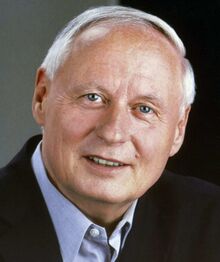Paul Bachmeier
This article is incomplete because it is pending further input from participants, or it is a work-in-progress by one author. Please comment on this article's talk page to share your input, comments and questions. Note: To contribute to this article, you may need to seek help from the author(s) of this page. |
Paul Bachmeier OVF[a] | |
|---|---|
 Bachmeier in 2005 | |
| Chancellor of Vierzland | |
| In office 10 July 2000 – 16 January 2010 | |
| Deputy | Sahra Fellner Erhardt Preisner |
| Preceded by | Wenzel Dahlke |
| Succeeded by | Erhardt Preisner |
| Chairman of the Democratic Labour Party | |
| In office 2 October 1999 – 19 December 2009 | |
| Deputy | Hugo Koeppen Patrick Kroeger |
| Preceded by | Per Koehne |
| Succeeded by | Erhardt Preisner |
| Member of the Federal Assembly from Rastede | |
| In office 10 July 2000 – 14 January 2012 | |
| Preceded by | Philip Plessner |
| Succeeded by | Lydia Brenner |
| Constituency | 4th district |
| Member of the National Assembly from Rastede | |
| In office 14 March 1990 – 4 January 1992 | |
| Preceded by | Office created |
| Succeeded by | Office abolished |
| Constituency | 5th district |
| Mayor of Gidenburg | |
| In office 3 April 1984 – 13 January 1986 | |
| Preceded by | Helge Nemetz |
| Succeeded by | Otto Abicht |
| In office 24 April 1986 – 5 April 1992 | |
| Preceded by | Otto Abicht |
| Succeeded by | Jacob Baumer |
| Personal details | |
| Born | Paul Josef Bachmeier 14 August 1948 Belzig, Rastede, Vierz Empire |
| Political party | Independent (1984–1990) United Republicans (1990–1996) Democratic Labour Party (1996–present) |
| Spouse(s) | Sophie Biel (1974–1983) Kathrin Bachmeier (1995-present) |
| Alma mater | Imperial University of Gidenburg Adtrus School of Economics |
| Military service | |
| Allegiance | |
| Branch/service | Imperial Vierz Army Imperial Security Service (ISD) |
| Years of service | 1967–70 (Army) 1970–76 (ISD) |
| Rank | |
| Unit |
|
Paul Josef Bachmeier (born 14 August 1948) is a Vierz statesman who served as Chancellor of Vierzland from 2000 to 2010. He was an elected representative in both the National Assembly and Federal Assembly for a timespan from 1990 to 2010. He was also the chairman of the Democratic Labour Party from 1999 to 2009.
Bachmeier was born in 1948 to a lower-middle class family in Belzig, Rastede, in what was then the Vierz Empire. He was conscripted into the Imperial Vierz Army in 1967 and saw combat in Caraq until he was transferred to the Imperial Security Service (ISD). He left the ISD in 1976 and studied philosophy at the Imperial University of Gidenburg. He graduated in 1980 and did further studies at the Adtrus School of Economics in 1983. In 1984, at age 35, Bachmeier was elected mayor of Gidenburg, the youngest person ever elected to that position. He gained national attention for his outspoken criticism of the Vierz military intervention in Luepola and the national government, drawing the ire of emperor Victor IV. He was dismissed as mayor by Victor IV in January 1986, sparking nationwide outrage that culminated in the 1986 Vierz protests demanding his reinstatement. He was reinstated as mayor in April 1986. In 1988, he was reelected mayor with a record 91.3% of the vote.
During his mayoral term, Bachmeier was elected as one of Rastede's representatives to the newly-formed National Assembly in 1990 as a member of the United Republicans. He worked closely with then-chancellor Heinrich Werner to author the new constitution, arguing strongly for republicanism and deimperialization, and identifying with the left-wing of the party. With the National Assembly's dissolving and the end of his second mayoral term in 1992, Bachmeier declined to participate in the 1992 elections. He left the UR and joined the Democratic Labour Party (DAP) in 1996.
Bachmeier became the leader of the DAP in 1999 and led the party to a landslide victory in the 2000 elections, securing a supermajority in the Federal Assembly. As Chancellor, Bachmeier was strongly committed to reshaping Vierzland's foreign policy. He conducted the first state visit to Luepola since the end of the Luepolan War in 1985. Bachmeier's government expanded funding for social welfare programs and infrastructure and public works projects. His flagship projects were nationwide healthcare reform and the construction of a new international airport in Adtrus.
Bachmeier is considered one of the most popular Vierz chancellors of all time, commanding a high level of popular support during both of his terms. He was known for his pragmatism and moderate nationalism that allowed him to bring various political factions to endorse significant policy proposals. Bachmeier was praised by the left for his commitment to the working class, and to the right for upholding the legacy of Heinrich Werner. He finished his second term in 2010 and did not participate in that year's election. He was succeeded by his groomed successor Erhardt Preisner.
Notes
- ↑ Ehrenorden der Vierzische Föderation, Order of Honour of the Vierz Federation